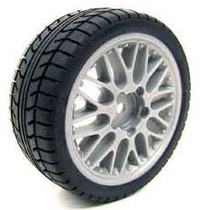Improving Listening Skills among Salespersons May Boost Sales of Additional Services and Customer Loyalty at Replacement Tire Retailers in Japan
 |
TOKYO--February 24, 2011: Ensuring that sales staff at replacement tire retailers actively listen to customers is key to improving success in cross-selling additional products and services, according to the J.D. Power Asia Pacific 2010 Japan Replacement Tire Retailer Customer Satisfaction Index (ST-RSI) Study released today.
The study, now in its second year, measures customer satisfaction with replacement tire retailers by examining four factors (listed in order of importance): salesperson (34%); service skill (26%); shop facility (21%); and product offered (19%).
The study finds that customers who indicate that their salesperson was willing to listen to their questions and concerns are increasingly likely to purchase additional products and services from the replacement tire retailer. Among these customers, the proportion who used the retailer for vehicle inspections and other services is 10 percentage points higher than among customers who do not state that their salesperson listened to their questions and concerns. Similarly, the proportion of customers who purchased auto accessories is six percentage points higher among those who indicate that their salesperson listened adequately.
Furthermore, among customers whose salesperson was willing to listen to questions and concerns, satisfaction with the retailer averages 136 points (on a 1,000-point scale) higher than among customers of salespersons who were not active listeners. Likewise, the percentage of customers who say that they “definitely would” purchase their next set of replacement tires from the same retailer is 23 percentage points higher, on average, among customers whose salesperson listened to questions and concerns.
“The tire labeling system that was launched in 2010 and new fuel-efficient tires that have been introduced by manufacturers tend to prompt many questions from customers,” said Tetsushi Furuya, manager at J.D. Power Asia Pacific, Tokyo. “Therefore, it is essential that salespeople are willing to listen to customer questions and concerns. If handled properly, this could help to increase revenue for tire retailers for both the short- and long- term.”
Among the various types of replacement tire retailers examined in the study, customers who purchased at auto dealerships are the most highly satisfied, followed by customers who purchased from tire specialty stores, auto repair shops, gas stations and auto parts stores, respectively. Customers of auto dealerships indicate they are particularly satisfied with the shop facility and the salesperson factors, while customers of tire specialty stores and auto repair shops are particularly satisfied with service skill.
The study also finds that the average customer-reported amount paid for one replacement tire decreased by 7 percent in 2010, to an average of ¥15,300, from ¥16,500 in 2009.
“With the decline in average spending per customer, competition based upon price has intensified among replacement tire retailers,” said Furuya. “In this environment, it becomes particularly important for replacement tire retailers to explore avenues for maintaining and increasing revenue, such as cross-selling additional services and products.”


